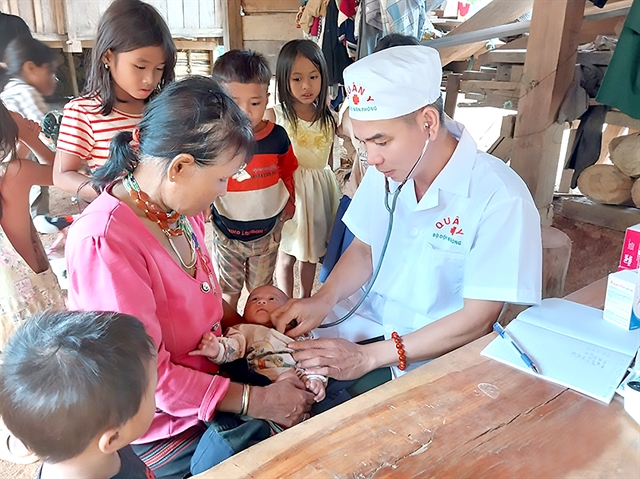 Society
Society

 |
| Doctor Trần Minh Vũ examines a baby in Pa Linh village. — Photo courtesy of qdnd.vn |
QUẢNG TRỊ — Major Trần Minh Vũ, a military doctor at A Vao border post, Border Guard Command of Quảng Tri Province, is happy to see so many children born safely at the remote mountainous military clinic.
Doctor Vũ, who has nearly 30 years of medical experience, has travelled across the country before arriving at this bordering village to work at the Pa Linh military clinic.
The clinic is located independently at the edge of the forest with only Vũ on duty.
People often joke that he is the richest person in the border post because he owns the "private hospital" in Pa Ling village. For the Pa Kô ethnic minority, this clinic is like a "general hospital", Quân Đội Nhân Dân (People’s Army) newspaper reported.
Patients are examined and treated by doctor Vũ. Only severe cases have to be transferred to higher-level facilities.
Until now, Pa Ling village in A Vao Commune, Đakrông District, remains one of the most difficult and remote place in Quảng Trị province.
It's not just remote in terms of distance, but also due to the difficulties that people must overcome to reach it.
During the dry season, the road is dusty and filled with countless potholes, while during the rainy season, it becomes muddy and flooded, turning it into an isolated island.
Major Nguyễn Văn Chinh, deputy head of A Vao border post, said after the historic flood in October 2020, for several months, soldiers had to transport supplies across landslide areas. The local residents faced the same challenges when receiving relief goods.
In May 2023, the concrete road from the centre of A Vao Commune to Pa Ling village was opened, but everyone knew that it would likely suffer landslides due to the relentless forest rains.
The lives of rural people has been improving, but backward customs are not easily changed.
A custom of the Pa Kô requires that pregnant women must leave their home and give birth by herself in a makeshift tent without any help. Pa Kô people believe that a woman who gives birth at home will bring bad luck to the community.
Communication efforts and actual medical treatments have helped the local residents realise that when they are ill, they should seek a doctor rather than a shaman.
"Women are now allowed to give birth at the clinic after a long time of encouraging them to wipe out the custom," Vũ said.
"Now, they receive postnatal care and guidance on how to properly care for their babies."
Doctor Vũ recalled an unforgettable a case that Hồ Thị Lọ, a pregnant woman went into labour at 1am during heavy rainfall.
"The husband of the pregnant woman urgently knocked on my door," he recalled.
"I quickly got up because I knew there was a patient, and it might be an emergency."
"I hurriedly took my medical bag, a flashlight and put on my raincoat and rushed into the rainy night to assist his wife in delivering the baby safely."
"A baby girl was born safely much to the happiness of her parents and myself."
Lọ is not the first expectant mother in Pa Ling whom doctor Vũ has assisted.
He said that helping in childbirth is not difficult, but what he fears most is complications like postpartum haemorrhage, obstructed labour, or breech birth when the clinic lacks the necessary equipment. While there is no shortage of medications for postpartum haemorrhage, proper storage requires a freezer, which is not available.
It's not that the people are unaware of the dangers of childbirth complications, and it's not because of outdated thinking. But the main thing is that they are poor.
To answer the question of why people don't go to the Đakrông District Health Centre, Vũ explained: "They are too poor to afford to go to the hospital. Health insurance only covers hospital fees and medications. They need money for travel and food while staying at the hospital."
For the border guards, helping the people is an act of love and responsibility. Of course, the local residents are always grateful for what the soldiers do for them.
Hồ Văn Dăng, Lọ's husband, said: "My wife and I are very grateful to doctor Vũ. He helped our child to be born safely and even provided money to buy milk. I'm very happy that our daughter has a name given by him. Whatever name he chooses, our family likes it." — VNS




